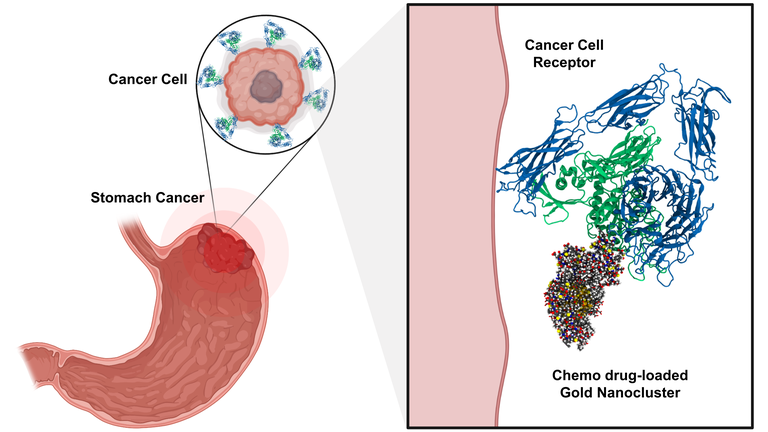At the University of Jyväskylä’s Nanoscience Center (NSC) in Finland, scientists have suggested a potential drug delivery system built from gold nanoclusters to achieve targeted gastric cancer therapy.
 Targeted and chemo drug-loaded gold nanoclusters can recognize and bind to tumor-specific receptors found on the surface of cancer cells. After entering the tumor cell, the chemo drug is released, increasing the efficacy of the treatment and reducing toxic effects on surrounding healthy tissues. Image Credit: Francisca Matus, University of Jyväskylä.
Targeted and chemo drug-loaded gold nanoclusters can recognize and bind to tumor-specific receptors found on the surface of cancer cells. After entering the tumor cell, the chemo drug is released, increasing the efficacy of the treatment and reducing toxic effects on surrounding healthy tissues. Image Credit: Francisca Matus, University of Jyväskylä.
The computational study acts as a predictive tool at an experimental level. It enables the decision-making process to identify the features of the nanosystem that can be used to attain the correct balance between targeting capability and therapeutic effect.
The study was the first paper published in the journal ACS Nanoscience Au.
Gastric (stomach) cancer (GC) is an aggressive cancer with a minimal early diagnosis rate. Existing GC therapies concentrate on traditional chemotherapy, where chemo drugs serve as a potent non-specific intracellular poison to prevent cell division.
They have the potential to kill cancer cells, but, on the other hand, they are poisonous for healthy tissues. So, there is an immediate requirement to develop a more effective treatment process for GC to fight its increasing incidence.
To this end, water-soluble and atomically accurate gold nanoclusters (AuNCs) have proved to be a potential material for cancer nanomedicine, considering their remarkable aspects, such as excellent stability, superior biocompatibility, and efficient renal clearance, which means they can be removed from the body by the kidney and excreted in the urine.
The research team headed by Professor Hannu Häkkinen used these peculiar properties, developing and characterizing, at a computational level, an array of multifunctional AuNCs with the ability to be employed in combination therapy in GC treatment. Hence, altering the molecular layer that covers the metal center of nanoclusters is necessary to functionalize the AuNCs for applications.
The new functionalized AuNCs feature a therapeutic component (chemo drug) and deliver a targeting move by peptide molecules. AuNCs filled with these molecules can recognize tumor-specific receptors overexpressed in cancer cells, particularly on that site.
The scientists could therefore explain the highly potential ligand combinations and how the peptide or drug ratio can impact the targeting strength of the AuNCs with all-atom molecular dynamics simulations. Key aspects were observed when the peptide was preferred over the drug.
But the researchers showed that the functionalization should be developed case-by-case because the features of the nanosystem are controlled by various factors such as the interactions between the different structural components and the composition of the AuNCs.
These computational methods provide efficient screening tools to design optimal nanosystems and allow selecting the best candidates among many options which optimizes resources in the experimental stage that follows.
Francisca Matus, Study Lead Author and Postdoctoral Researcher, University of Jyväskylä
“This exciting work expands our knowledge and internal collaborations at Nanoscience Center of the University of Jyväskylä to nanomedicine,” noted Professor Hannu Häkkinen, who coordinated the study.
The computations were executed at the CSC computing center in Finland (Grand Challenge Project NanoGaC) and by using the Finnish Computing Competence Infrastructure (FCCI) in the University of Jyväskylä.
Journal Reference:
Matus, M. F., et al. (2021) Ligand Ratio Plays a Critical Role in the Design of Optimal Multifunctional Gold Nanoclusters for Targeted Gastric Cancer Therapy. ACS Nanoscience Au. doi.org/10.1021/acsnanoscienceau.1c00008.